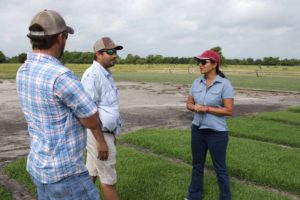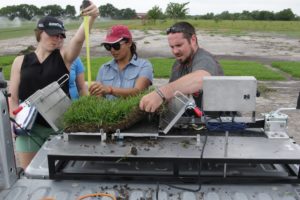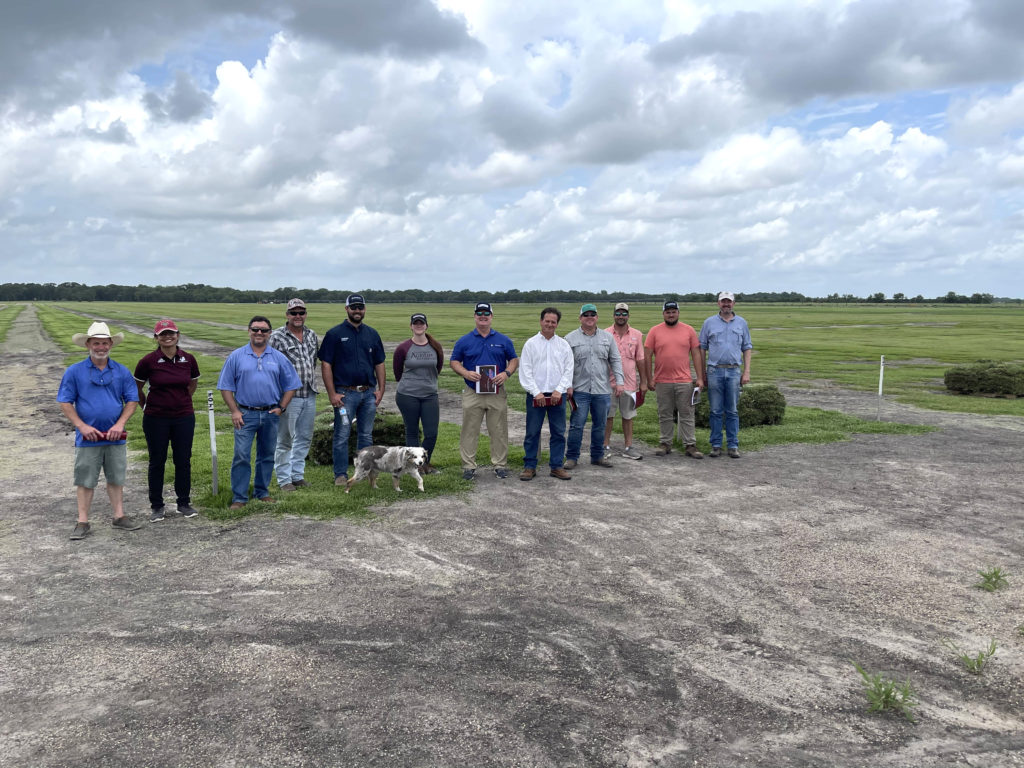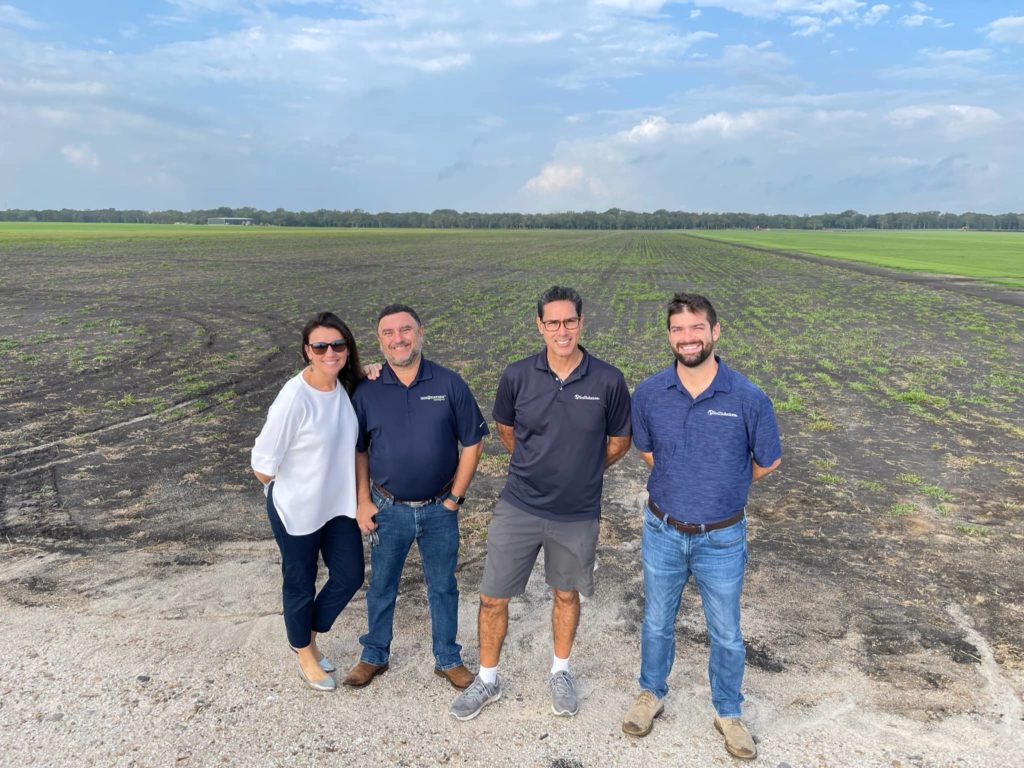
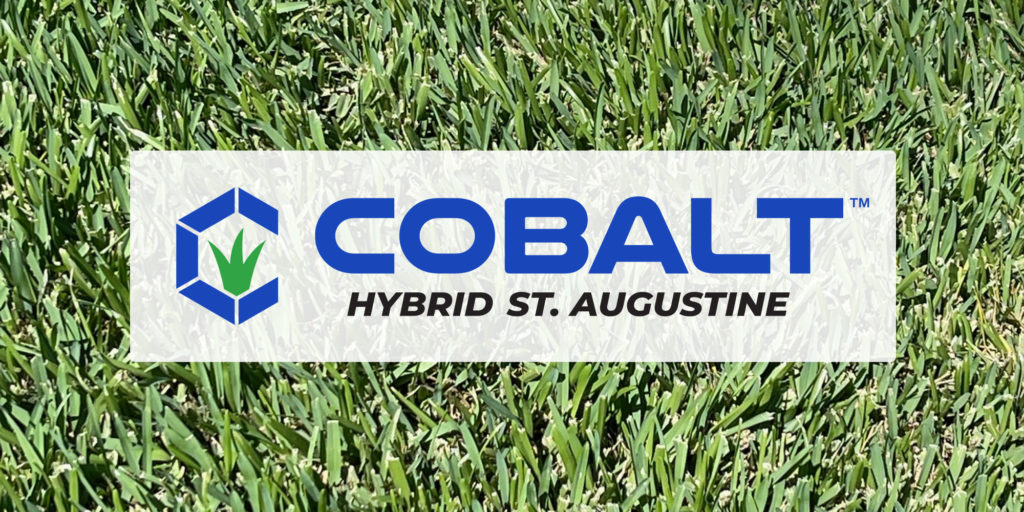
Introducing Cobalt™ Hybrid St. Augustinegrass
The Texas A&M AgriLife Research program and turfgrass breeder Dr. Ambika Chandra have officially released Cobalt™ Hybrid St. Augustinegrass (experimental designation DALSA 1618). After nearly 20 years of research and development, Cobalt was selected over other experimental turfgrass lines for its commercial potential.
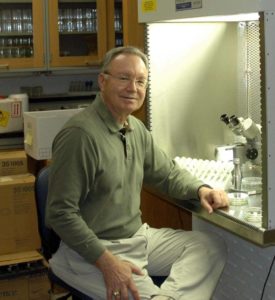
Dr. Dennis Genovesi using embryo rescue technology to develop St. Augustinegrass interploid hybrids.
“Cobalt will change how the industry views and uses St. Augustinegrass. Its drought resistance will reduce the frequency of irrigation needed to maintain a healthy lawn. Water is an extremely important resource and data shows that Cobalt is one of the most drought resistant St. Augustinegrasses ever developed,” states Dr. Chandra.
This progeny is an interploid hybrid and was created through embryo rescue technology where sterile polyploid germplasm (with drought and pest resistance) is crossed with fertile diploid genotypes (with superior shade, cold tolerance and visual characteristics).
Cobalt features excellent drought resistance, very good shade tolerance, is tolerant of disease, has a good establishment rate and is winter hardy (USDA cold hardiness zone of 8a). This selection has an excellent visual quality with a dark green genetic color and a wide leaf blade and stolons.
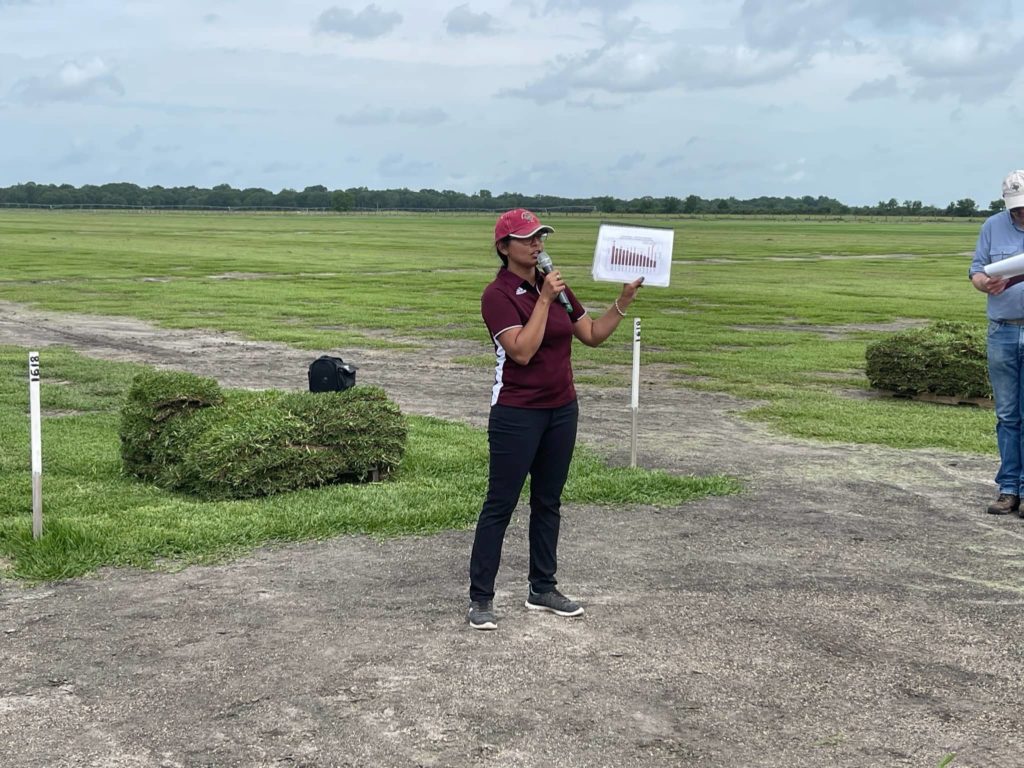
Dr. Ambika Chandra explains the qualities of Cobalt™ at Kubicek Turf Farms (2021).
St. Augustinegrass Research Group
The St. Augustinegrass Research Group (SARG) is a program that started in 2003 with a group of Texas sod producers getting together to support and fund the breeding program at Texas A&M with the goal of developing an improved St. Augustinegrass variety. The aim of this venture was to breed a grass with good drought and disease resistance and at the same time, it should grow fast and harvest well, producing good solid pieces of sod.
With those parameters set, the Texas A&M turfgrass breeding team started working on making crosses between selected parents and deploying embryo rescue technology as needed. After many years of cross-pollination, work done in laboratories and field evaluations, a group of eight elite varieties was selected based on their performance at several test areas in Texas and across the Southeastern US: TXSA-26, DALSA 1318, DALSA 1329, DALSA 1404, DALSA 1405, DALSA 1406, DALSA 1502 and Cobalt (DALSA 1618).
These experimental lines were planted at two sod farms: Kubicek Farms (South Texas) and A-1 Turf Farm (North Texas) in June and July of 2018. These eight elite lines were planted initially in 5 x 10 ft long plots, which later were extended to 20 ft long, to allow harvesting with a sod harvester. This specific design was developed by Texas A&M in collaboration with turfgrass development company Sod Solutions. The “long plot” was a result of Sod Solutions years of experience testing new varieties of grasses. A good candidate for the market needs to harvest well and that can only be identified by growing the grasses in a layout that allows a commercial grade sod harvester to harvest sod.
All eight elite lines were evaluated for disease resistance, genetic color, overall quality and drought resistance. The grasses were harvested 3 times: May 2019, August 2019 and July 2020 and tensile strength evaluated with a device used by Texas A&M researchers. A group of producers were present during the harvesting to help identify the best grasses and make additional evaluations. Dr. Ambika Chandra was the lead breeder coordinating the testing along with Dr. Chrissie Segars from Texas A&M and Roberto Gurgel, Sod Solutions Executive Director of Research.
After all varieties were harvested and tested, the data was compiled and analyzed for all aspects. After years of observation, four advanced lines were selected based on their final evaluations for sod quality and performance at a sod farm: DALSA 1318, DALSA 1329, DALSA 1404 and Cobalt (DALSA 1618).
Final Four Varieties
These final four varieties were expanded and planted (July 2020) in a new area in Wharton TX. Planting was done with a commercial plug planter and each plot covered a much larger area, ranging from 12,000 to 20,000 sq ft. This time, more than just harvesting and testing the tensile strength, the larger areas were designed to provide plant stock material for a foundation block that producers use to plant their fields.
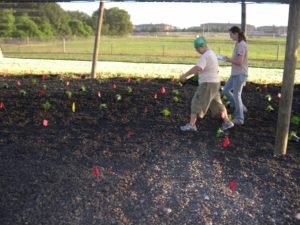
Dr. Meghyn Meeks and Sandy Wisdorf planting a shade trial at Texas A&M AgriLife-Dallas.
After one year of growth, the final four selections were compared taking into consideration not only their performance in the larger plots but also considering data from research trials.
Cobalt was ranked as one of the top entries by the 2015 USDA-SCRI warm-season grass research group for drought resistance where it was evaluated across five southern states (TX, FL, GA, NC and OK). Likewise, Cobalt was evaluated across seven universities (eight environments) through the 2016 National Turfgrass Evaluation Program and was ranked in the top statistical group suggesting wide-range adaptation.
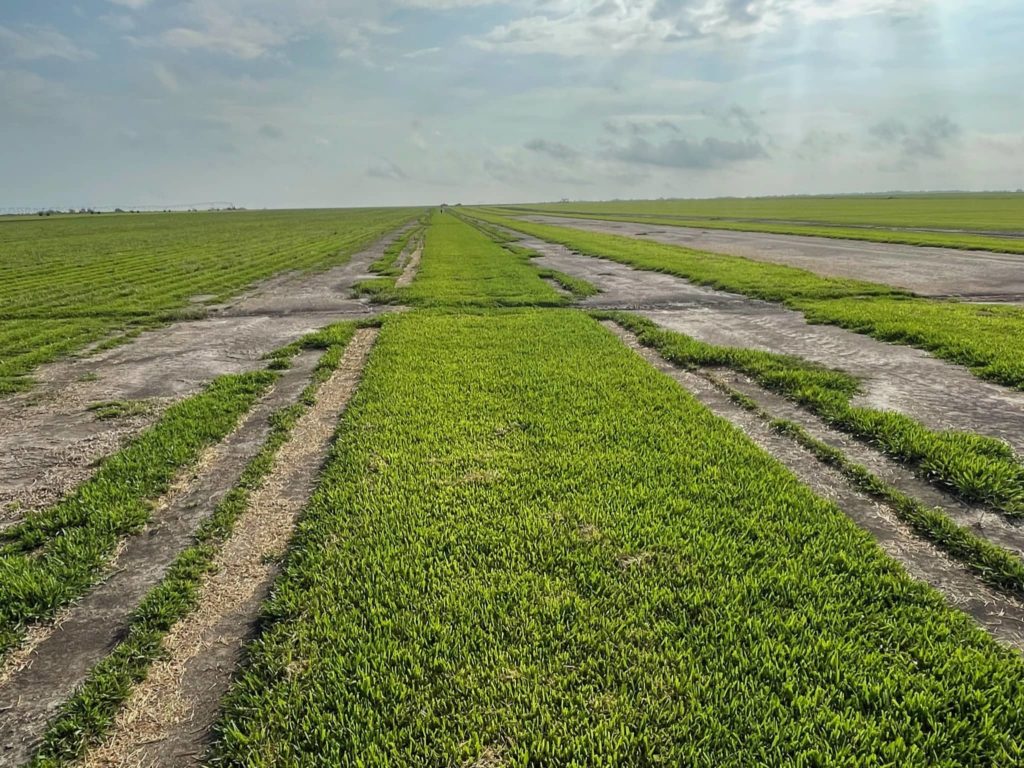
Cobalt™ Field at Kubicek Turf Farms on October 12, 2021.
Final Selection
Cobalt (DALSA 1618) was the final selection, an ERT (Embryo Rescue Technology) derived interploid hybrid, a grass with excellent drought resistance, very good shade and disease resistance and good establishment. It’s superior performance in Dallas, TX; Griffin, GA and Raleigh, NC suggests reasonably good winter hardiness. Cobalt has a wide leaf blade and stolon with dark green genetic color. Additionally, this variety has low thatch and establishes well at sod farms.
A second experimental grass – DALSA 1318 (a diploid) – from that final four group is going to be evaluated for a couple more years because it has an excellent establishment ratio, growing in faster than any other grass including Cobalt. However, it does not have the same level of drought resistance or shade tolerance as Cobalt.
“With both 1318 and 1618, both have really good shade tolerance,” Dr. Chandra explained last summer during a presentation at Kubicek Turf Farms. “With these, we now have a combination of shade tolerance and drought resistance. If you have a customer coming looking for a St. Augustinegrass for shade you have that with these varieties; and now you will be able to say these have significantly better drought resistance with reduced watering requirements too.”
Sod Solutions President Tobey Wagner describes Cobalt as a scientific breakthrough, with over a decade of breeding and research. “It consistently performs well at sites across the country from subtropical to transition zones. Studies showed it was cold tolerant and the 2021 polar vortex (when the air temperature dropped as low as 1 degree Fahrenheit) that blasted through the central and southern United States was the ultimate real-life test for this grass. Cobalt survived and thrived through the cold event,” Wagner shared.
A 10-acre Foundation block of Cobalt was planted the first week of September 2021, using the plant material grown during the last 13 months. Now, Cobalt is being expanded across Texas and Florida but will include other areas in the near future. Wagner said that there is also a possibility of an international impact from Cobalt as the demand for a high-quality drought resistant, shade tolerant and disease resistant St. Augustinegrass grass is coveted in many countries around the world.
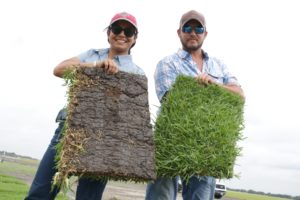
Dr. Ambika Chandra holding blocks of Cobalt with Jason Otto of Kubicek Turf Farms.
“Dr. Chandra and the SARG group should be extremely proud of the work and research put into this unique and outstanding St. Augustinegrass. I firmly believe Cobalt will perform exceptionally well among competing St. Augustinegrasses,” Wagner said. “We are thrilled to bring this grass to the market. Cobalt combines the positive attributes desired with St. Augustinegrass into a single grass with unlimited potential.”
Cobalt will be exclusively licensed through Sod Solutions for commercial production and marketing. Any sod farms interested in seed stock availability should contact Christian Broucqsault at [email protected].
For more information on Cobalt, watch this video of Dr. Chandra speaking about its traits at Kubicek Turf Farms:

